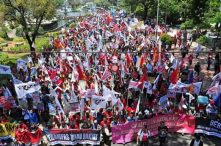A week of action Commemorating the National Farmers Day 24 September 2016
Ahead of the two-year reign, the sound of Tri Sakti had not yet sounded. Economic development agenda has been turned back into the path of liberal economic (market economy). Throughout the year 2016, major national economic policy agenda is filled with the interests of the market economy. Economic policy package volume 1 to volume 13, published in the period September 2015 to August 2016, is package of measures for the benefit of markets and investments. In July 2016 set by Law Tax Amnesty, as a policy would eliminate taxes for capital owners who do not want to pay taxes which is then given a variety of facilities and conveniences for their investment.
The fate of the National Agrarian Law (1950) is very different from the Tax Amnesty Law. Tax Amnesty Law targeting 1,508 large taxpayers (wealth above 100 billion), immediately executed with all devices and instruments that have been prepared. Meanwhile the National Agrarian Law which was 56 years old and a legal umbrella for 14.62 million family farmers and farm workers never executed.
Tri Sakti in the description the vision and mission of Jokowi, self-sufficient in the economy realized by placing people as holders sovereignty economic and financial management of the state. What is the definition of the people in nawacita ?. whether the monopoly of a handful of citizens owners of big capital in this country included in the definition of the people in nawacita ?.

Photos by MTCP2 Indonesia 


The Fake Agrarian Reform Deny The Principles Of Law No. 5 Of 1960
In the fifth Nawacita agenda elaborated that Jokowi-JK will increase welfare
through Land Reform and land ownership program for 9 million hectares. But in RPJMN document has been distortion of meaning and deflection direction of the agrarian reform program. Only 4.5 million hectares of land to be distributed to the people and 4.5 million hectares of the land certificate program. And models of distribution of 4.5 million hectares of land are also being manipulated for the benefit of investors, through a partnership transmigration with plantations, there is the usual transmigration, there transmigration in cooperation with the partnership of the people.[1] The Ministry of Agriculture has said that he needs 2 million hectares of land allocation for investment in plant oil palm, sugar mills and food estate, as part of the distribution scheme. Presidential Staff Office who initiated the establishment of the Agrarian Reform Task Team is also not out of the scheme, and concerns have increasingly diverged with the cooperation with the institutions of the anti against agrarian reform. Agrarian reform deflected understood in Community Forestry or Social Forestry, who did not complete the tenure inequality and land ownership. Ministry of Agrarian expected to be implementing agrarian reform, assume authority solely limited to matters of land administration
Thus the agrarian reform program are scheduled at this time not in accordance with the mandate and the principles contained in Law No. 5 of 1960. Agrarian policy agenda that brought the government can not be separated from the livery, under the influence and control of the market and the interest of the World Bank. It can be inferred from the parties who want to revise Law No. 5 of 1960 with regulations more friendly to the market, as well as policies to establish the Land Bank, which is part of the World Bank project for the liberalization of the land market.
Related with the momentum of the National Farmers Day in 2016, the Indonesian Farmers Consultative Body (BAMUSTANI) will organize a series of actions during the week (22 September-27 September 2016) to commemorate the National Farmers Day 2016.
Thus the momentum associated with the National Farmers Day in 2016, the Indonesian Farmers Consultative Body (BAMUSTANI) urged the government to:
- Immediately Implement Genuine Agrarian Reform
We reject the false agrarian reform which deny the constitutional mandate of Article 33 UUD 1945 (original text) and Law No. 5 of 1960. Fake agrarian reform is the agrarian policy is executed for the benefit of the market and some of the capital owners / corporations, without changing the structure of domination and inequality of land ownership.
- Complete the Agrarian Conflicts
We reject the agrarian conflict resolution through mediation and partnership approach, because only preserve inequality of land ownership and governance structure and protect the interests of a few owners of capital / corporate.
- Implement the Food Sovereignty
We reject the fulfillment of self-sufficiency through food import policy, and the policy of food production through the expansion of agribusiness investments, which benefit large investors. IMMEDIATELY STOP FOOD IMPORT.
- Immediately the institutional form of food
We reject the establishment of institutional food, which is a mere formality. Namely the institutional form of food, but still running principles, duties and authority of the institutions of previous / existing.
- Forms Authority Agrarian Reform (BORA)
To carry out agrarian reform, it is necessary in the Form of Agrarian Reform Authority with strong authority to be able to run the mandate of Law No. 5 of 1960 and directly responsible to the President.
Jakarta, September 2016
Indonesian Farmers Consultative Body (BAMUSTANI)
Serikat Petani Indonesia (SPI) – Ikatan Petani Pengendali Hama Terpadu (IPPHTI)
Aliansi Petani Indonesia (API) – Wahana Masyarakat Tani dan Nelayan Indonesia (WAMTI)
Contact persons:
- Henry Saragih (0811 655 668)
- Muhammad Nuruddin (0813 3434 4808)
- Agustin Pulungan (0812 9184 101)
- Kustiwa Adinata (0812 2398 953)
[1] Statement of the Ministry of Environment and Forests after a limited cabinet meeting of February 27, 2015. At the same time, the Ministry of Agriculture states require 2 million hectares for oil palm factory investment, sugar mills and food estate project.

Comments are closed